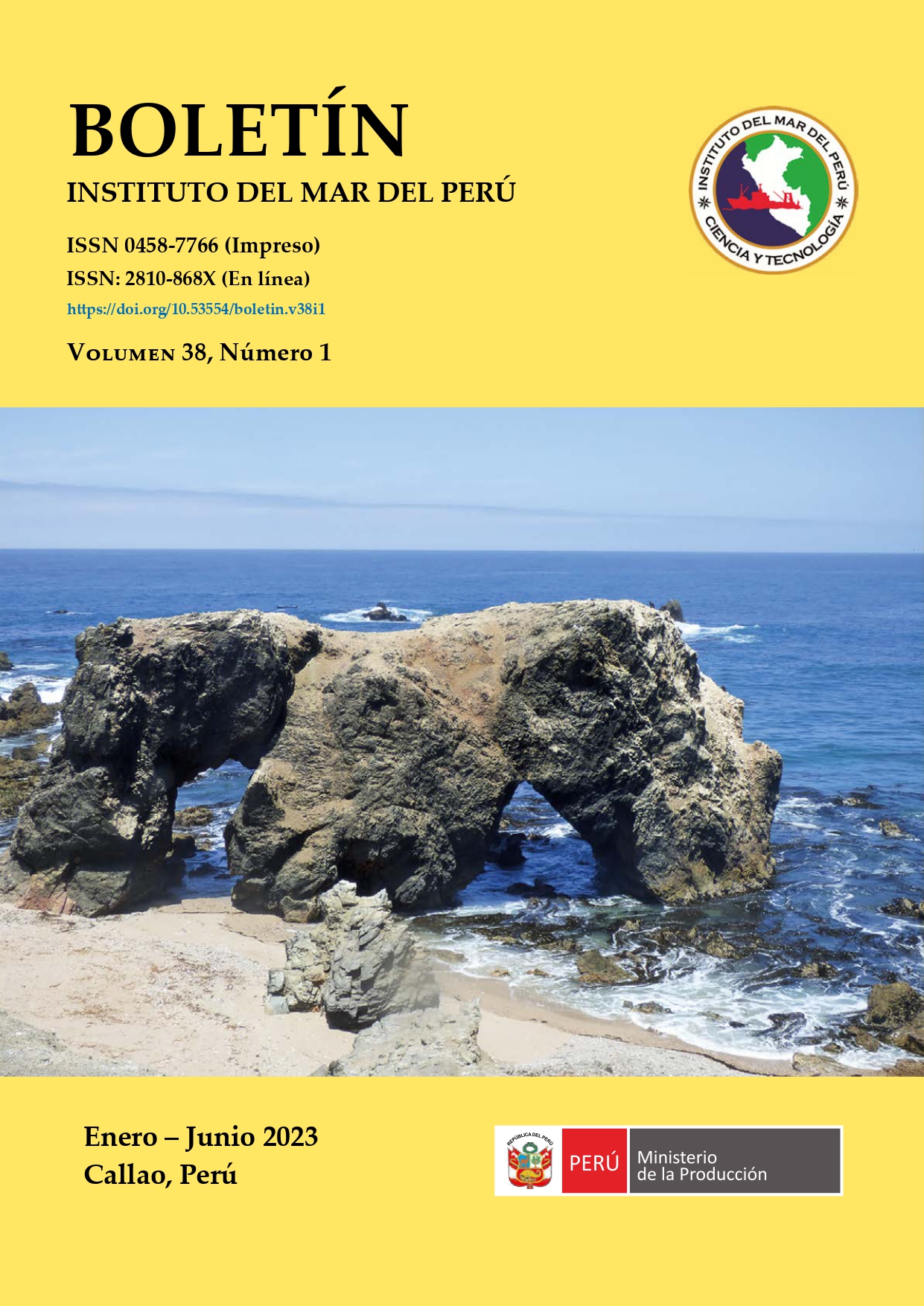Chemical sea conditions in Miraflores Bay: summer and spring of 2013 and 2014
DOI:
https://doi.org/10.53554/boletin.v38i1.382Keywords:
Inorganic nutrients, Physicochemical properties, Miraflores Bay, PerúAbstract
This study presents findings on the chemical conditions of seawater in Miraflores Bay during the summer and spring of 2013 and 2014. Data were collected in March and between late September and early October, respectively. A total of 32 sampling stations were established along perpendicular profiles to the coast, with water samples collected at surface and bottom levels. Miraflores Bay, located in the central region of Peru, exhibits distinct characteristics in its northern and southern areas due to its geographical configuration. The formation of eddies in the northern region promotes water retention and creates physicochemical conditions favoring high phytoplankton biomass. Conversely, the southern region experiences greater water exchange influenced by coastal upwelling, resulting in lower temperature (< 16 °C), reduced oxygen content (< 4 mL/L), and lower pH (< 8.1). Anthropogenic impact from domestic wastewater discharge, particularly from the La Chira sewer outfall, is observed, leading to increased phosphate levels at the surface and bottom levels in the southern zone, exceeding normal values. In contrast, nitrates tend to decrease, with concentrations below 5 µM, particularly during the summer and spring seasons, indicating their consumption through biogeochemical processes facilitated by low oxygen levels.
Downloads
Alternative Metrics
Metrics
References
Carrit, D. & Carpenter, J. (1966). Comparison and evaluation of currently employed modifications of Winkler method for determination dissolved oxygen in sea water. Journal of Marine Research, 24(3). 286-318. https://elischolar.library.yale.edu/journal_of_marine_research/1077
Guzmán, E. (2007). Aplicación del modelo de transporte de sedimentos Unibest CL 6.0 a la bahía de Miraflores. Dirección de Hidrografía y Navegación. https://docplayer.es/54215781-Aplicacion-del-modelo-detransporte-de-sedimentos-unibest-cl-6-0-a-la-bahiade-mirafores-resumen.html
Hamersley, R., Lavik, G., Woebken, D., Rattray, J. E., Lam, P., Hopmans, E., Sinninghe, J., Krüger, S., Graco, M., Gutiérrez, D. & Kuypers, M. (2007). Anaerobic ammonium in the Peruvian oxygen minimum zone. Limnology and Oceanography, 52(3), 923-933. https://doi.org/10.4319/lo.2007.52.3.0923
Holm-Hansen, A., Lorenzen, C., Holmes, R. & Strickland, J. (1965). Fluorometric determination of chlorophyll. ICES Journal of Marine Science, 30(1), 3-15. https://doi.org/10.1093/icesjms/30.1.3
Jacobo, N., Sánchez, S., Bernales, A., Chang, F. & Flores, G. (2021). Variabilidad estacional del fitoplancton y su asociación con parámetros físicosquímicos, bahía de Miraflores (12°S). Inf Inst Mar Perú, 48(2), 173-185. https://biblioimarpe.imarpe.gob.pe/handle/20.500.12958/3571
Kameya, A., Elliott W., Moron, O., Saravia, B., Delgado, E., Girón, M. & Cárcamo, E. (1995). I Prospección Bio-Oceanográfica y Pesca en el Callao (Playas Carpayo, Arenilla, Cocos y Mar Brava). Inf Prog. Inst Mar Perú, (11), 1-29. https://repositorio.imarpe.gob.pe/handle/20.500.12958/1367
Libes, S. M. (2009). Introduction to Marine Biogeochemistry. Elservier.
Majluf, P. (2014). Identificación de ecosistemas y servicios ecosistemáticos dentro del ámbito de la “Costa Verde” con proceso de selección N° 002-2014-MML-APCVGA/AA. Fundación Cayetano Heredia. http://www.apcvperu.gob.pe/files/estudios/Ecosistemas_2.pdf
Pitcher, G. C., Aguirre-Velarde, A., Breitburg, D., Cardich, J., Carstensen, J., Conley, D. J., Dewitte, B., Engel, A., Espinoza-Morriberon, D., Flores, G., Garçon, V., Graco, M., Grégoire M., Gutiérrez, D., Hernández-Ayon, J. M., Huai-Hsuan, M. H, Isensee, K., Jacinto, M. E., Levin, L., ...Zhu, Z.Y. (2021). System controls of coastal and open ocean oxygen depletion. Progress in Oceanography, 197, 1-79. https://doi.org/10.1016/j.pocean.2021.102613
Quispe J., Vásquez L., García, W., Morón O., Pizarro L., Flores G., Sánchez S. & Flores R. (2022). Hidrografía y estratificación en la bahía de Miraflores. Marzosetiembre 2014. Inf Inst Mar Perú. 49(1), 122-136. https://biblioimarpe.imarpe.gob.pe/handle/20.500.12958/4044
Strickland, J. & Parsons T. (1972). Practical Handbook of Seawater Analysis. Fisheries Research Board of Canada, (167), 1-311. http://dx.doi.org/10.25607/OBP-1791
Unesco. (1983). Chemical methods for use in environmental monitoring. Manual and Guides, (12), 1-53. http://hdl.handle.net/11329/87
Yentsch, C. & Menzel, D. (1963). A method for determination of phytoplankton chlorophyll and phacophytin by fluorescence. Deep Sea Research, 10(3), 221-231. https://doi.org/10.1016/0011-7471(63)90358-9
Downloads
Published
How to Cite
Issue
Section
License
Copyright (c) 2023 Boletin Instituto del Mar del Perú

This work is licensed under a Creative Commons Attribution 4.0 International License.









